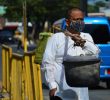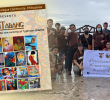From Fr. Alfonso Suico,Jr.,MD,CSSR
When news came out that a fellow doctor got the coronavirus, it brought the reality of the disease close to home. Medically speaking, we have not seen the peak of COVID-19 yet, but it has already caused so many changes and disruption in our lives. In the historic Urbi et Orbi blessing, Pope Francis began his message saying that it has been like evening for many weeks when darkness has gathered over many communities and countries. True enough, when we look at the internet for news or get updates from social media, all we hear are the news of new cases and more deaths.
The disease itself is frightening enough, but the other prospects are just as daunting. The quarantines, lockdowns, and physical distancing only highlighted the disparity of the rich and middle class from the majority living in poverty. Even the government threatens the lives and fundamental rights of its citizens. People are afraid. They are hungry. People feel isolated. It is as if we are living in a nightmare that we want to wake up. What makes it more surreal is that it is Holy Week when in this country, people are used to gathering in worship. But now, our churches are empty, even as many are becoming more prayerful in the confines of their homes.
The empty streets and the anxious looks of people today bring to mind what transpired after Jesus was killed on the cross. For the many Jews, life went on, but for his disciples, their lives had changed. They felt frustrated that after leaving everything behind to follow the man they called master, he was crucified by the Romans. Yes, they remembered what he taught them, but they were gripped with fear. They feared that the soldiers might come after them next. On that Saturday, after the crucifixion, the disciples were tired, anxious, and afraid.
For Christians today, Holy Saturday is a prelude to the light of Easter when we believed that Christ triumphed over death and rose again. However, a genuine Black Saturday experience is to undergo what Jesus’ disciples underwent, including the uncertainty and the lingering darkness. In this time of COVID, we are living in a long Black Saturday as cases of the disease increase and more people clamor for food and provisions. Unlike the rituals of Holy Week, when the days of the Triduum are definite, our Black Saturday experience is open-ended. We do not know when this pandemic will end or how it will end. We face the possibility of getting the contagion and even facing death as the darkness grips our hearts.
However, we can ask if this will be the end for us? Do death and despair have the final say? Our faith teaches us otherwise. We are an Easter people who believe in the resurrection. We believe that things do not end here, because beyond death, there is life, and beyond this pandemic, there is hope. All is not lost, even when faced with COVID-19 and other challenges. So we hope that we, too, will overcome all the fears and despair of the time, because in Christ the Risen One, healing overcomes disease and life triumphs over death.
May the Peace of Easter be upon us all.(davaotoday.com)










